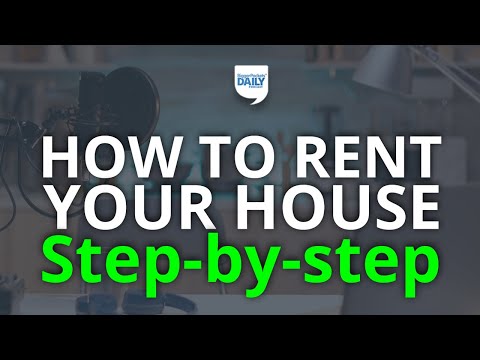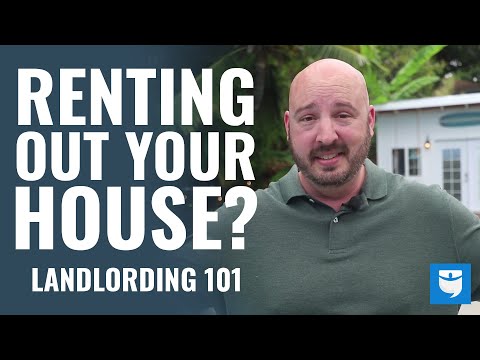Renting out a house can be a rewarding way to make some passive income, but like any financial venture, it comes with its share of responsibilities and risks. Understanding how to rent out your house requires a blend of financial savvy, legal knowledge, and people skills. Let’s dive in.

The Key Considerations Before Deciding to Rent Out Your Property
Before you post that “For Rent” sign, let’s get down to brass tacks. First up, understand your motivations. Being a landlord isn’t a walk in the park. You’re running a business, not just collecting checks. If you’re up for playing the long game – great!
Next, assess the market. The sweet spot for renting is when demand outstrips supply. If you’re in a tenant’s market, your memories of baking pies in that kitchen won’t translate to dollars. Know your audience and the local rental vibe.

Can I Rent Out My House Without Telling My Mortgage Lender?
Short answer: It’s like wearing a black maxi skirt to a mud run – possible but not advisable. Legally, your mortgage agreement likely requires you to get consent before changing the use of your home from personal to rental. Also, if you’re stealthy about it and things go south, you could face worse than a slap on the wrist – think penalties, or a due-on-sale clause kicking in.

| Step | Details | Notes |
|---|---|---|
| 1. Research Local Laws | Check city and state regulations on rental properties. Registration may be required in certain areas, and Texas has city-specific ordinances. | Dallas, for instance, mandates annual registration for the Single-Family Rental Program. |
| 2. Prepare the Property | Ensure the property meets local housing codes and standards for safety and habitability. Perform necessary repairs and maintenance. | Consider professional cleaning and staging to attract tenants. |
| 3. Obtain Necessary Licenses/Permits | Verify if a state license or local permit is required. Different regulations for long-term vs. vacation rentals. | Florida requires licenses for vacation rentals but not all states do for long-term residential rentals. |
| 4. Set Rental Price | Research local market to set competitive rates. Consider the costs of mortgage, taxes, insurance, and maintenance. | Utilize online rental price calculators or consult a real estate professional. |
| 5. Create a Lease Agreement | Draft a legally binding contract that outlines the terms of the rental, including rent, duration, and rules. | Consult a lawyer or use a reputable online template to ensure it’s comprehensive. |
| 6. Market the Property | Use online platforms, local newspapers, and real estate agents to advertise your rental. Include high-quality photos and a detailed description. | Consider SEO strategies to improve online listing visibility. |
| 7. Screen Tenants | Conduct thorough background and credit checks. Verify income and rental history. | Use a reliable tenant screening service to help with this process. |
| 8. Manage the Property | Decide if you’ll manage the property yourself or hire a property management company. | Property management involves regular maintenance, emergency repairs, and tenant relations. |
| 9. Handle Financials | Set up a process for collecting rent and addressing non-payments. Keep detailed records for taxes and legal purposes. | Online payment systems can streamline the rent collection process. |
| 10. Review and Adjust | Regularly review lease agreements, rental prices, and property management practices to ensure they continue to meet your needs and comply with laws. | Stay informed on changes in the rental and real estate market. |
How to Rent a House Legally and Ethically
Knowing the law isn’t just good karma; it’s essential. Landlord-tenant laws can be tighter than a drum, so avoid playing it by ear. From deposits to evictions, know your do’s and don’ts. Safety-wise, you want your property to be tighter than Fort Knox – secure, compliant, and hazard-free.

Preparing Your House for Tenants: The Landlord’s Checklist
Reflect on what tenants need: a solid roof, functioning systems, and maybe a cozy feel. You must balance your spending – it’s a tightrope walk between splurging on marble countertops and ensuring the A/C doesn’t croak on move-in day. A well-maintained home will snag renters faster than you can say “repair”.

How to Become a Landlord: Understanding Responsibilities and Rights
This is bigger than just fixing leaky taps. Set up your rental biz like a pro – licenses, registration (hello, cities with regulations like Dallas), and getting cozy with tax implications, including goodies like the “1250 property” classification. Landlord duties are a list longer than your grocery list – from vetting tenants to tackling midnight emergencies.
Marketing Your Rental Property: Strategies that Attract Quality Tenants
Think of marketing like fishing – you need the right bait. A compelling ad is like a siren song for quality tenants. It’s a cocktail of great visuals, enticing descriptions, and showcasing your property’s best features. Mix in digital platforms and traditional avenues for a casting net that covers the best of both worlds.
Financial Matter: Setting Up the Rental Rate and Gathering Returns
Pricing your rental is an art form – too high, and tenants flee; too low, and you’re leaving money on the table. Competitive rent is the golden goose here. For the green side of things, be firmer than a mattress on policy – clear rules on deposits, rent collection, and rate increases keep things smoother than a jazz tune.
How to Rent Out Your House with a Robust Lease Agreement
A solid lease is your shield. It’s not just paperwork; it’s protection. It should cover every if, and, or but about living in your property. Think about pet policies, maintenance responsibilities, and, yes, even the subletting rules. Craft your lease like a strategist – detailed, thorough, and bulletproof.
How to Rent Your House by Creating a Positive Landlord-Tenant Relationship
Good communication is the bedrock of landlord-tenant relations. It sets the tone like a good prelude. Be as clear as a bell when laying out rules and expectations. If disputes arise, keep your cool. Professional, solution-oriented conversations are your best ally.
Managing Your Rental Property: DIY vs. Hiring a Property Manager
To manage or not to manage – that’s the question. Self-management saves you a few bucks, sure, but hiring a property manager can save you from a world of headaches. If you’re juggling more than you can handle or would rather spend Sundays with your feet up than unclogging someone’s drain, consider the pros might outweigh the cons.
How to Rent Out Your House and Ensure Ongoing Compliance and Safety
Being proactive is key. Regular inspections are like the health check-ups of your property – they keep things running smoothly. Compliance isn’t static; it’s a moving target with changing laws and regulations. Stay informed so you won’t be caught off-guard.
How to Rent Out Your House while Mitigating Risks
Mitigating risks in renting out your property is like playing defense in sports. Get the right landlord insurance to shield you from financial blindside hits. Develop strategies for handling nonpayments and evictions – it’s less about being tough and more about being smart.
Transitioning Your House into a Successful Rental
Keep tabs on your property’s performance. Requesting feedback is like asking for directions – it’s practical and guides you to improve. Always think about how you can reinvest in your property, because in real estate, you reap what you sow.
The Road to Becoming a Successful Landlord: Reflecting on the Journey
Every landlord’s journey is as unique as a fingerprint. Learn from the pros, be it through case studies or stories of those who’ve walked this path. Keep your eyes on the prize and stay flexible – the financial landscape changes more often than fashion trends.
By exploring each of these steps, you’ll have a comprehensive understanding of how to rent out your house in a way that’s both simple and secure. Dive into the depths of real estate wisdom, and emerge as a successful landlord. Keep learning, and you might just find your next tenant is easier to find than a Winn dixie pharmacy in a metropolitan neighborhood. Your adventure begins now! Cheers to your new life as a landlord.
Fun Facts and Handy Hints for Renting Out Your Abode
Renting out your house can be as exciting as uncovering hidden treasures—as long as you’ve got the map and the right tools! Trust me, you’ll want to know the ins and outs of this adventure. Let’s dive into some fascinating tidbits and ace advice that’ll make renting out your place a breeze.
Say “Hello” to Extra Income and “Goodbye” to Tax Headaches
You might think you’re just adding extra cash to your piggy bank, but look out! Uncle Sam’s got his eye on you. Oh, you didn’t know? Here’s the scoop: renting out your place comes with tax implications. And if you’re not up-to-speed, you could end up with a tax time headache bigger than your new tenant’s sofa. But hang on, it’s not all doom and gloom. Did you ever hear about the “depreciation recapture tax rate“? Because buddy, that’s something you’ll wanna wrap your head around. It might sound like gobbledygook now, but, essentially, it’s the tax you might pay on the part of your rental income that’s from depreciation. And let me tell you, getting clued up on this can save you a pretty penny. Make sure to check out “the ins and outs of depreciation recapture tax rate” to avoid a nasty surprise.
Screening Tenants: Better Safe than Sorry!
Alright, imagine handing over your house keys to a stranger. Gives you the jitters, doesn’t it? Well, it’s not something to take lightly. You gotta be like a detective with a magnifying glass when screening potential tenants. One hot tip, always ask for a “proof Of funds letter“. It’s like a golden ticket that shows they aren’t just blowing smoke and can actually afford your place. A legit “proof of funds letter” will show you the money, literally, and give you peace of mind. So, don’t skip this step unless you fancy a game of rental roulette!
Word on the Street: Use a Lease Agreement
Here’s the deal – wordy contracts might seem like a snooze fest, but when it comes to renting out your pad, they’re your best friend. Seriously. A lease agreement is like your house’s superhero, guarding your rights and keeping the peace between you and your tenant. Make it as detailed as possible to cover all your bases. And hey, unless you want to play courtroom drama later, don’t even think about using a handshake deal; get it in writing.
Keep It Spick-and-Span
Oh, and don’t forget, no one’s going to want to rent a place that looks like it’s been through a cyclone. So, if you want the dough to start rolling in, you better make that place sparkle like the top of the Chrysler Building. A clean house not only attracts better tenants, but it also sets the bar high from the get-go. Trust me; they’ll take better care of your place if you show them how it’s done.
So, there you have it, some essential nuggets of wisdom and trivia for renting out your nest. Stick to these pointers, and you’ll have a safe, legal, and profitable landlord experience. Happy renting!

Do I need a license to rent my house in Texas?
Well, hold your horses before you start renting out your Texas home! There’s no statewide requirement to have a license just to rent out your house. However, local ordinances can be pesky, so it’s smart to double-check with your local government to avoid any “oops” moments.
Do I need a license to rent my house in Florida?
When it comes to Florida, no license is required to rent out your house, either. But don’t take it as a free pass! It’s worth taking a gander at local laws, as some areas might have their own rules that’ll have you jumping through hoops.
What are the requirements to rent a house in Texas?
In the Lone Star State, the requirements for renting out your house aren’t as tough as a two-dollar steak. You’ll need to make sure your rental pad meets health and safety codes, keep up with necessary repairs, and provide those keys to your tenant without unreasonable delays. And remember, don’t forget to comply with fair housing laws!
Is it legal to rent to own a house in Texas?
Rent-to-own in Texas? Absolutely, y’all! It’s as legal as barbecue and football on a Sunday. But let me tell ya, you don’t want to fumble the paperwork. Get everything in writing and make sure all the terms are clear as day to avoid a Texas-sized misunderstanding down the road.
Is it legal to rent a room in your house in Florida?
In sunny Florida, renting out a room in your house is legal as long as you’re not breaking any local zoning laws. So go ahead, make a little extra cash! Just keep it above board and remember to play nice with the neighborhood rules.
How much can you legally raise rent in Florida?
Oh boy, when it comes to raising rent in Florida, it’s like walking a tightrope—there’s no statewide limit! But hey, you’ve gotta give your tenant at least 60 days’ notice if you’re planning to hike the rent more than 10%. Try to keep those increases fair, or you might just have a vacancy on your hands quicker than you can say “see ya!”
Are 30 day rentals allowed in Florida?
In the land of oranges and sunshine, 30-day rentals are certainly allowed in Florida. However, don’t get too comfy—some areas might throw you a curveball with specific regulations or require a short-term rental license. Always check local laws; it’s better to be safe than sorry!
Do you need a license to manage short term rentals in Texas?
Yeehaw! In Texas, if you’re looking to manage short-term rentals, better saddle up and get licensed under the Texas Real Estate Commission if you’re doing it for others and not just yourself. It’s not the Wild West; there are rules to follow!
What can landlords not do in Texas?
In Texas, landlords can’t act like they’re wearing a sheriff’s badge. Nope, no funny business like entering a tenant’s home without proper notice or messing with their utilities as a form of eviction. It’s important to keep things on the up and up, or you could find yourself in a legal hoedown.
Is rent regulated in Texas?
Rent regulation in Texas is as rare as a blue moon. State law doesn’t set a cap on rent increases, which means it’s more like the Wild West for rent rates. But, y’all gotta remember that lease agreements are still the law of the land, and any changes need that handshake (aka written notice) in advance.
How do I become a leasing agent in Texas?
Wanna be a leasing agent in Texas? Roll up your sleeves because you’ll need to get licensed. First up: a 180-hour real estate course. Next, pass that licensing exam with flying colors. Then, find a broker willing to sponsor you. Keep your nose to the grindstone, and before you know it, you’ll be leasing like a pro!



